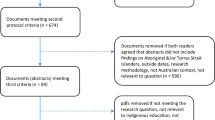Abstract
In this response to commentaries by Ali Sammel, Jhumki Basu and Alberto Rodriguez, I present my perspective on three important issues raised by the commentators. These issues relate to the role of a researcher in her field settings and society, the critique of science and science education as oppressive dominant discourses, and co-opting participants as researchers. I argue that researchers should work actively for progressive change in discursive fields such as educational research, in which they are firmly embedded rather than playing an interventionist role in field settings where their discursive positionality maybe temporary and not that rooted. Regarding the critique of science and science education, my response favors a perspective wherein an understanding of the marginalization and oppression of non-western communities caused by western science and science education is counterbalanced by an appreciation of the ways in which marginalized communities can use science and science education for affecting progressive change. Lastly, I recognize the value of co-opting participants in writing and communication of research.

Similar content being viewed by others
References
Bhabha, H. (1994). The location of culture. New York: Routledge.
Certeau, M. d. (1988). The practice of everyday life (S. F. Rendall, Trans.). Berkeley: University of California Press.
Foucault, M. (1980). Truth and power. In C. Gordon (Ed.), Power/Knowledge: Selected interviews and other writings 1972–1977 (pp. 109–133). New York: Pantheon Books.
Foucault, M., & Deleuze, G. (1972). Intellectuals and power: A conversation between Michel Foucault and Gilles Deleuze [Electronic Version]. Retrieved April 14, 2008 from http://www.libcom.org/library/intellectuals-power-a-conversation-between-michel-foucault-and-gilles-deleuze.
Gramsci, A., Forgacs, D., & Hobsbawm, E. J. (2000). The Antonio Gramsci reader: Selected writings 1916–1935. New York: NYU Press.
Nanda, M. (2004). Prophets facing backward: Postmodern critiques of science and hindu nationalism in India. New Brunswick: Rutgers University Press.
Weedon, C. (1987). Feminist practice and postructuralist theory. New York, NY: Blackwell.
Wertsch, J. V., Tulviste, P., & Hagstrom, F. (1993). A sociocultural approach to agency. In E. A. Forman, N. Minick, & C. A. Stone (Eds.), Contexts for learning: Sociocultural dynamics in children’s development. New York: Oxford University Press.
Zizek, S. (2006). The universal exception. New York: Continuum International Pubishing Group.
Author information
Authors and Affiliations
Corresponding author
Rights and permissions
About this article
Cite this article
Sharma, A. Science, science education and their discontents: a response to commentaries on the paper, Portrait of a Science Teacher as a Bricoleur: A case study from India . Cult Stud of Sci Educ 3, 875–880 (2008). https://doi.org/10.1007/s11422-008-9131-z
Received:
Accepted:
Published:
Issue Date:
DOI: https://doi.org/10.1007/s11422-008-9131-z




